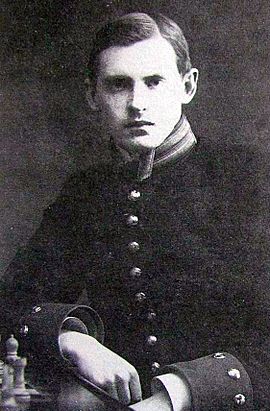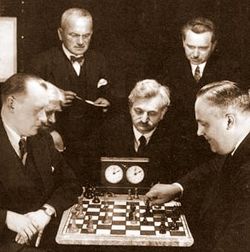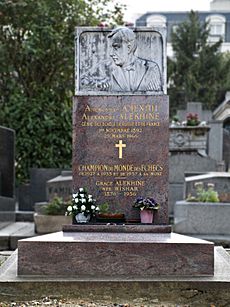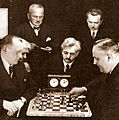Alexander Alekhine facts for kids
Quick facts for kids Alexander Alekhine |
|
|---|---|
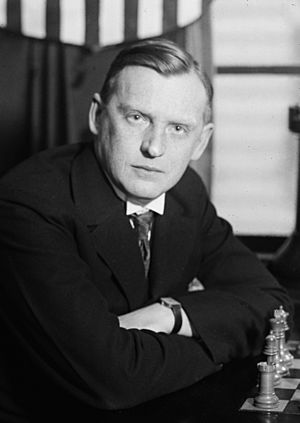
Alekhine, c. 1924
|
|
| Full name | Alexander Alexandrovich Alekhine |
| Country | Russian Empire → Soviet Russia (before 1921) France (after 1924) |
| Born | October 31, 1892 Moscow, Russian Empire |
| Died | March 24, 1946 (aged 53) Estoril, Portugal |
| World Champion | 1927–1935 1937–1946 |
Alexander Alekhine (October 31, 1892 – March 24, 1946) was a Russian and French chess player. He was the fourth World Chess Champion, holding the title twice.
By age 22, Alekhine was already one of the world's best chess players. In the 1920s, he won many chess tournaments. In 1921, he left Russia and later played for France. In 1927, he became the fourth World Chess Champion by beating José Raúl Capablanca.
In the early 1930s, Alekhine was very strong in tournaments. He won two big ones easily. He also led the French team in five Chess Olympiads. He won many individual awards there. Alekhine offered Capablanca a rematch, but they couldn't agree on the rules. He easily defended his title against Efim Bogoljubow in 1929 and 1934. Max Euwe beat him in 1935, but Alekhine won his title back in 1937. However, his tournament results varied. New young players like Paul Keres and Mikhail Botvinnik were becoming strong challengers. Talks for a title match with Keres or Botvinnik stopped when World War II began in 1939. Negotiations with Botvinnik were happening in 1946. But Alekhine died in Portugal under unclear circumstances. He is the only World Chess Champion to die while still holding the title.
Alekhine was known for his strong and creative attacking style. He was also very good at endgames and understanding positions. People highly regard him as a chess writer and expert. He created new ideas in many chess openings. One opening, Alekhine's Defence, is named after him. He also created some endgame studies.
Contents
- Biography: Alexander Alekhine's Life Story
- World Chess Champion: First Reign (1927–1935)
- Losing and Regaining the World Title (1935–1937)
- World Chess Champion: Second Reign (1937–1946)
- How Good Was Alekhine?
- Other Information About Alekhine
- Writings by Alekhine
- Summary of Chess Results
- Images for kids
- See also
Biography: Alexander Alekhine's Life Story
Early Years: Growing Up and Learning Chess
Alekhine was born into a rich Russian family in Moscow. His birthday was October 31, 1892. His father was a landowner and a government official. His mother was the daughter of a wealthy businessman. Alekhine learned chess from his mother, his older brother Alexei, and his older sister Varvara.
First Steps in Chess: 1902–1914
Alekhine's first known game was in a correspondence chess tournament. It started in December 1902 when he was ten years old. He played in several such tournaments until 1911. In 1907, he played his first in-person tournament in Moscow. By 1908, at age 15, he won the Moscow chess club's Spring Tournament. In 1909, he won the All-Russian Amateur Tournament. Over the next few years, he played in stronger tournaments, some outside Russia. By age 16, he was one of Russia's top players. In January 1914, Alekhine won his first big Russian tournament. He tied for first place with Aron Nimzowitsch in the All-Russian Masters Tournament.
Becoming a Top Player: 1914–1927
In April–May 1914, Alekhine took third place in a major tournament in St. Petersburg. He finished behind Emanuel Lasker and José Raúl Capablanca. Some stories say that Tsar Nicholas II gave the title of "Grandmaster of Chess" to the top five players. Whether true or not, this success made Alekhine a serious challenger for the World Chess Championship. In July 1914, Alekhine tied for first place in Paris.
World War I and Life in Russia
In July–August 1914, Alekhine was leading a tournament in Germany when World War I started. He and ten other Russian players were held in Germany. Alekhine was freed in September 1914 and returned to Russia.
Back in Russia, he helped raise money for chess players still held in Germany. He did this by giving special chess shows. In December 1915, he won the Moscow Chess Club Championship. In 1918, he won a tournament in Moscow. In June 1919, he was briefly put in jail in Odessa.
Chess Life from 1920 to 1927
When things settled in Russia, Alekhine showed he was one of the best players. In January 1920, he won the Moscow championship perfectly, winning all games. In October 1920, he won the All-Russian Chess Olympiad. This was later called the first USSR Championship.
In March 1920, Alekhine married Alexandra Batayeva, but they divorced a year later. In 1921, he married Annelise Rüegg. Soon after, he got permission to leave Russia with his wife. He never went back. From 1921 to 1927, Alekhine won or shared first prize in about two-thirds of his tournaments.
Alekhine's main goal was to play a match against Capablanca. The biggest problem was a rule that said the challenger had to raise $10,000. This was a lot of money back then. Alekhine traveled a lot, playing many games at once to earn money. In 1924, he set a world record by playing 26 games blindfolded at the same time. He broke his own record in 1925 by playing 28 games blindfolded.
In 1924, he applied to live in France and become a French citizen. He also studied law at the Sorbonne. He was known as "Dr. Alekhine" later on. He became a French citizen in November 1927. In October 1926, Alekhine won a tournament in Buenos Aires. In 1927, he married his third wife, Nadiezda Vasiliev.
World Chess Champion: First Reign (1927–1935)
Winning the Title in 1927
In 1927, Alekhine's challenge to Capablanca was supported by businessmen and the president of Argentina. The World Championship match was in Buenos Aires. Alekhine won the title, scoring 6 wins, 3 losses, and 25 draws. This was a big surprise to the chess world. Alekhine had never beaten Capablanca before. After Capablanca's death, Alekhine said he was surprised by his own win. He thought Capablanca might have been too confident.
No Rematch with Capablanca
After winning, Alekhine said he would give Capablanca a rematch. But he insisted on the same tough rules Capablanca had set for him. This included the challenger providing $10,000. Negotiations went on for years but never worked out. Their relationship became difficult. The rematch never happened.
Defending the Title Against Bogoljubov
Alekhine played two world title matches against Efim Bogoljubov. He won easily both times. The first was in 1929. Alekhine kept his title, scoring 11 wins, 5 losses, and 9 draws. The second was in 1934. He beat Bogoljubov by five games.
Strong Play in the Early 1930s
Alekhine was very dominant in chess until the mid-1930s. He won the San Remo 1930 chess tournament easily. He also won the Bled 1931 chess tournament by a large margin. He won most of his other tournaments. In 1933, he played first board for France in four Chess Olympiads. He won gold medals for his performance.
In the early 1930s, Alekhine traveled the world. He gave many simultaneous exhibitions. In July 1933, he played 32 people blindfolded at once. This was a new world record. He won 19 games, drew 9, and lost 4.
In 1934, Alekhine married his fourth wife, Grace Freeman. She was 16 years older than him.
Losing and Regaining the World Title (1935–1937)
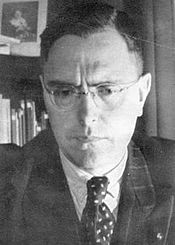
In 1933, Alekhine challenged Max Euwe to a championship match. Euwe was seen as one of the top challengers. The match began on October 3, 1935, in the Netherlands. Alekhine started with a lead. But Euwe won more games later on. Euwe became the new champion on December 16, 1935. He had 9 wins, 13 draws, and 8 losses. This was a big surprise.
In the 18 months after losing his title, Alekhine played in ten tournaments. His results were mixed. He tied for first in some and placed lower in others.
World Chess Champion: Second Reign (1937–1946)
Winning Back the Title: 1937–1939
Max Euwe quickly arranged a return match with Alekhine. Alekhine won back the title from Euwe in December 1937. He won by a large margin, with 10 wins, 4 losses, and 11 draws. Alekhine played no more title matches after this. He held the title until he died.
1938 started well for Alekhine. He won tournaments in Montevideo and Margate. In November, he tied for 4th–6th place in the AVRO tournament. This tournament was played in several Dutch cities. The younger players did better, perhaps because the travel was tiring for older players.
After the AVRO tournament, Mikhail Botvinnik challenged Alekhine for the world championship. They agreed on a prize fund. But World War II stopped their plans. Paul Keres, who won the AVRO tournament, also challenged Alekhine. These talks also stopped because of the war.
Alekhine was playing for France at the 8th Chess Olympiad in Buenos Aires in 1939. World War II broke out in Europe during the event. The tournament continued. Alekhine won an individual silver medal. After the Olympiad, Alekhine won tournaments in Montevideo and Caracas.
During World War II (1939–1945)
Alekhine returned to Europe in January 1940. He joined the French army as a sanitation officer. After France fell to Germany, he tried to go to America. He applied for a visa in Lisbon but was denied.
Chess During the War
Alekhine played in chess tournaments in Germany and German-occupied areas. Many strong players did this during the war. In 1941, he tied for second in Munich. He shared first in Kraków/Warsaw. He won in Madrid. In 1942, he won in Salzburg and Munich. He also won in Warsaw/Lublin/Kraków. In 1943, he drew a match with Bogoljubov. He won in Prague and tied for first with Keres in Salzburg.
By late 1943, Alekhine spent his time in Spain and Portugal. He was a German representative at chess events. This also helped him avoid the Soviet invasion. In 1944, he won a match in Zaragoza. He also won in Gijón. In 1945, he won in Madrid, Sabadell, and Melilla. He tied for first in Almeria. Alekhine's last match was in January 1946. He won against Francisco Lupi.
Alekhine was interested in the young chess talent Arturo Pomar. He wrote about him in his last book. They played in 1944 when Pomar was 12. He managed a good draw against the champion.
Last Year and Death
After World War II, Alekhine was not invited to tournaments outside Spain and Portugal. This was because of his supposed links to the Nazis. An invitation to a London tournament in 1946 was taken back. Other players protested his presence.
Alekhine died on March 24, 1946, in his hotel room in Estoril, Portugal. He was 53 years old. The cause of his death is still debated. It is often said to be a heart attack. But some say he choked on food.
His burial was paid for by FIDE, the world chess organization. His remains were moved to Paris, France, in 1956. His gravestone was damaged by a storm in 1999 but was later fixed.
How Good Was Alekhine?
Playing Style and Strength
Baden-Baden 1925
| a | b | c | d | e | f | g | h | ||
| 8 |

|
8 | |||||||
| 7 | 7 | ||||||||
| 6 | 6 | ||||||||
| 5 | 5 | ||||||||
| 4 | 4 | ||||||||
| 3 | 3 | ||||||||
| 2 | 2 | ||||||||
| 1 | 1 | ||||||||
| a | b | c | d | e | f | g | h | ||
Alekhine was at his best in the early 1930s. He won almost every tournament then. After that, his play declined. He never won a top tournament after 1934. After he regained his title in 1937, many new strong players emerged.
Alekhine was one of the greatest attacking players. He could create amazing combinations of moves. What made him special was seeing attacks where others saw nothing. Chess master Rudolf Spielmann said, "I can see the combinations as well as Alekhine, but I cannot get to the same positions." Dr. Max Euwe called him "a poet." John Nunn noted that Alekhine could "provoke complications without taking excessive risks."
Garry Kasparov said Alekhine's attacks were based on strong positional play. Harry Golombek said Alekhine was "the most versatile of all chess geniuses." He was good at every style of play. Reuben Fine said Alekhine's best games were among the most beautiful.
Alekhine's games have more wins than any other World Champion's. His drawn games are also some of the longest. He really wanted to win, even in casual games.
Bobby Fischer ranked Alekhine as one of the ten greatest players ever. Kasparov said Alekhine had a big influence on him. He liked Alekhine's all-around approach to the game. In 2012, Levon Aronian called Alekhine the greatest chess player of all time.
His Impact on Chess
Endgame study
| a | b | c | d | e | f | g | h | ||
| 8 |

|
8 | |||||||
| 7 | 7 | ||||||||
| 6 | 6 | ||||||||
| 5 | 5 | ||||||||
| 4 | 4 | ||||||||
| 3 | 3 | ||||||||
| 2 | 2 | ||||||||
| 1 | 1 | ||||||||
| a | b | c | d | e | f | g | h | ||
Solution: 1.g5! Kc6 2.Ke5 Kd7 3.Kd5! (3.Kf6? Kxd6 4.Kxf7 Ke5) Kd8 4.Kc6 and White wins.
Many chess openings are named after Alekhine. Besides Alekhine's Defence, there are Alekhine Variations in other openings. Irving Chernev joked, "The openings consist of Alekhine's games, with a few variations."
Alekhine also created some endgame studies. One is shown in the diagram. It's a small study with only a few pieces.
Alekhine wrote over 20 chess books. Most were about games from big matches or tournaments. He also collected his best games. His books are for expert players. They have deep analyses of moves.
After his death, Alekhine was recognized by Soviet chess experts. Alexander Kotov wrote a biography about him. This led to a series of Alekhine Memorial tournaments. Mikhail Botvinnik said the Soviet School of chess learned from Alekhine's fighting spirit.
Stories About "Improved" Games
| a | b | c | d | e | f | g | h | ||
| 8 |

|
8 | |||||||
| 7 | 7 | ||||||||
| 6 | 6 | ||||||||
| 5 | 5 | ||||||||
| 4 | 4 | ||||||||
| 3 | 3 | ||||||||
| 2 | 2 | ||||||||
| 1 | 1 | ||||||||
| a | b | c | d | e | f | g | h | ||
Some people say Alekhine made up games. He would publish them as if he won against real opponents. One famous example is his game with five queens in Moscow in 1915. In the real game, Alekhine won. But in one of his books, he showed a different version. In this version, the "Five Queens" move led to a win for the White player.
Chess historian Edward Winter looked into a game Alekhine supposedly won in 15 moves. Photos of the game showed the pieces were in a different position. This made people suspect the published version was made up. Even if the published version is fake, Alekhine did win the actual game.
Other Information About Alekhine
In Cascais, Portugal, there is a street named after Alekhine. This town is near Estoril, where he died.
His book My Best Games of Chess 1924–1937 was in the film A Matter of Life and Death. The film was made in the year he died.
The asteroid 1909 Alekhin was named in his honor.
Writings by Alekhine
Alekhine wrote over 20 books about chess. Some well-known ones are:
- My Best Games of Chess 1908–1937
- The Book of the Hastings International Masters' Chess Tournament 1922
- The Book of the New York International Chess Tournament 1924
- The Book of the Nottingham International Chess Tournament
- The World's Chess Championship, 1937
- 107 Great Chess Battles 1939–1945 (edited by Edward Winter)
Summary of Chess Results
Tournament Results
Here are Alekhine's placings and scores in tournaments:
- Under score, + games won, − games lost, = games drawn
| Date | Location | Place | Score | Notes | |
|---|---|---|---|---|---|
| 1907 | Moscow | 11–13 | 5½/15 | +5−9=1 | his brother Alexei Alekhine tied for 4–6th |
| 1908 | Moscow | 1st | ? | ? | Moscow Chess Club Spring Tournament |
| 1908 | Düsseldorf | 3–4 | 9/13 | +8−3=2 | 16th DSB Congress, A Tournament |
| 1908/09 | Moscow | 1st | 6½/9 | +5−1=3 | Moscow Chess Club Autumn Tournament |
| 1909 | Saint Petersburg | 1st | 13/16 | +12−2=2 | All-Russian Amateur Tournament |
| 1910 | Hamburg | 7–8 | 8½/16 | +5−4=7 | 17th DSB Congress, Schlechter won |
| 1911 | Cologne | 1st | 3/3 | +3−0=0 | Quadrangular |
| 1911 | Carlsbad | 8–9 | 13½/25 | +11−9=5 | Teichmann won |
| 1912 | Saint Petersburg | 1–2 | 8/9 | +8-1=0 | First Winter Tournament, lost a game to Vasily Osipovich Smyslov |
| 1912 | Saint Petersburg | 1st | 7/9 | +6−1=2 ? | Second Winter Tournament, lost a game to Boris Koyalovich |
| 1912 | Stockholm | 1st | 8½/10 | +8−1=1 | 8th Nordic Championship, ahead of Spielmann |
| 1912 | Vilnius | 6–7 | 8½/18 | +7−8=3 | 7th Russian Championship (All-Russian Masters' Tournament), Rubinstein won |
| 1913 | Saint Petersburg | 1–2 | 2/3 | +2−1=0 | Quadrangular, tied with Levenfish |
| 1913 | Scheveningen | 1st | 11½/13 | +11−1=1 | ahead of Janowski |
| 1913/14 | Saint Petersburg | 1–2 | 13½/17 | +13−3=1 | 8th Russian Championship (All-Russian Masters' Tournament), tied with Nimzowitsch |
| 1914 | Saint Petersburg | 3rd | 10/18 | +6−4=8 | Lasker 13½, Capablanca 13, Alekhine 10, Tarrasch 8½, Marshall 8 |
| 1914 | Paris | 1–2 | 2½/3 | +2−0=1 | Cafe Continental Quadrangular, tied with Marshall, third Muffang, fourth Hallegua |
| 1914 | Mannheim | leading | 9½/11 | +9−1=1 | 19th DSB Congress, interrupted by the start of World War I |
| 1915 | Moscow | 1st | 10½/11 | +10−0=1 | Moscow Chess Club Championship |
| 1919/20 | Moscow | 1st | 11/11 | +11−0=0 | Moscow City Championship, not declared Moscow Champion because he was not a resident of Moscow |
| 1920 | Moscow | 1st | 12/15 | +9−0=6 | later recognised as the 1st USSR Championship |
| 1921 | Triberg | 1st | 7/8 | +6−0=2 | ahead of Bogoljubov |
| 1921 | Budapest | 1st | 8½/11 | +6−0=5 | ahead of Grünfeld |
| 1921 | The Hague | 1st | 8/9 | +7−0=2 | ahead of Tartakower |
| 1922 | Pistyan | 2–3 | 14½/18 | +12−1=5 | tied with Spielmann, behind Bogoljubov |
| 1922 | London | 2nd | 11½/15 | +8−0=7 | Capablanca 13, Alekhine 11½, Vidmar 11, Rubinstein 10½ |
| 1922 | Hastings | 1st | 7½/10 | +6−1=3 | Rubinstein 7, Bogoljubov and Thomas 4½, Tarrasch 4, Yates 2½ |
| 1922 | Vienna | 3–6 | 9/14 | +7−3=4 | Rubinstein won |
| 1923 | Margate | 2–5 | 4½/7 | +3−1=3 | Grünfeld won |
| 1923 | Carlsbad | 1–3 | 11½/17 | +9−3=5 | tied with Bogoljubov and Maróczy |
| 1923 | Portsmouth | 1st | 11½/12 | +11−0=1 | ahead of Vajda |
| 1924 | New York | 3rd | 12/20 | +6−2=12 | Lasker 16, Capablanca 14½, Alekhine 12, Marshall 11, Réti 10½. Maróczy 10, Bogoljubov 9½ |
| 1925 | Paris | 1st | 6½/8 | +5−0=3 | ahead of Tartakower |
| 1925 | Bern | 1st | 4/6 | +3−1=2 | Quadrangular |
| 1925 | Baden-Baden | 1st | 16/20 | +12−0=8 | ahead of Rubinstein |
| 1925/26 | Hastings | 1–2 | 8½/9 | +8−0=1 | tied with Vidmar |
| 1926 | Semmering | 2nd | 12½/17 | +11−3=3 | Spielmann won |
| 1926 | Dresden | 2nd | 7/9 | +5−0=4 | Nimzowitsch won |
| 1926 | Scarborough | 1st | 5½/6 | +5−0=1 | Alekhine won a play-off match against Colle 2–0 |
| 1926 | Birmingham | 1st | 5/5 | +5−0=0 | ahead of Znosko-Borovsky |
| 1926 | Buenos Aires | 1st | 10/10 | +10−0=0 | ahead of Villegas and Illa |
| 1927 | New York | 2nd | 11½/20 | +5−2=13 | Capablanca 14, Alekhine 11½, Nimzowitsch 10½, Vidmar 10, Spielmann 8, Marshall 6 |
| 1927 | Kecskemét | 1st | 12/16 | +8−0=8 | ahead of Nimzowitsch and Steiner |
| 1929 | Bradley Beach | 1st | 8½/9 | +8−0=1 | ahead of Lajos Steiner |
| 1930 | San Remo | 1st | 14/15 | +13−0=2 | Nimzowitsch 10½; Rubinstein 10; Bogoljubov 9½; Yates 9 |
| 1931 | Nice | 1st | 6/8 | +4−0=4 | consultation tournament |
| 1931 | Bled | 1st | 20½/26 | +15−0=11 | Bogoljubov 15; Nimzowitsch 14; Flohr, Kashdan, Stoltz and Vidmar 13½ |
| 1932 | Bern | 1–3 | 2/3 | +2−1=0 | Quadrangular, tied with Voellmy and Naegeli |
| 1932 | Bern | 1st | 12½/15 | +11−1=3 | Swiss Championship (title awarded to Hans Johner and Paul Johner) |
| 1932 | London | 1st | 9/11 | +7−0=4 | ahead of Flohr |
| 1932 | Pasadena | 1st | 8½/11 | +7−1=3 | ahead of Kashdan |
| 1932 | Mexico City | 1–2 | 8½/9 | +8−0=1 | tied with Kashdan |
| 1933 | Paris | 1st | 8/9 | +7−0=2 | ahead of Tartakower |
| 1933/34 | Hastings | 2nd | 6½/9 | +4−0=5 | Flohr 7, Alekhine and Andor Lilienthal 6½, C.H.O'D. Alexander and Eliskases 5 |
| 1934 | Rotterdam | 1st | 3/3 | +3−0=0 | Quadrangular |
| 1934 | Zürich | 1st | 13/15 | +12−1=2 | Swiss Championship (title awarded to Hans Johner) |
| 1935 | Örebro | 1st | 8½/9 | +8−0=1 | ahead of Lundin |
| 1936 | Bad Nauheim | 1–2 | 6½/9 | +4−0=5 | tied with Keres |
| 1936 | Dresden | 1st | 6½/9 | +5−1=3 | ahead of Engels |
| 1936 | Poděbrady | 2nd | 12½/17 | +8−0=9 | Flohr won |
| 1936 | Nottingham | 6th | 9/14 | +6−2=6 | Botvinnik and Capablanca 10; Euwe, Fine and Reshevsky 9½ |
| 1936 | Amsterdam | 3rd | 4½/7 | +3−1=3 | Euwe and Fine won |
| 1936 | Amsterdam | 1–2 | 2½/3 | +2−0=1 | Quadrangular, tied with Landau |
| 1936/37 | Hastings | 1st | 8/9 | +7−0=2 | Fine 7½, Eliskases 5½, Vidmar and Feigins 4½ |
| 1937 | Margate | 3rd | 6/9 | +6−3=0 | tied for 1–2 were Keres and Fine |
| 1937 | Kemeri | 4–5 | 11½/17 | +7−1=9 | tied for 1–3 were Flohr, Petrovs and Reshevsky |
| 1937 | Bad Nauheim | 2–3 | 3½/6 | +3−2=1 | Quadrangular, Euwe won, the other players were Bogoljubov and Sämisch |
| 1937 | Nice | 1st | 2½/3 | +2−0=1 | Quadrangular |
| 1938 | Montevideo | 1st | 13/15 | +11−0=4 | ahead of Guimard |
| 1938 | Margate | 1st | 7/9 | +6−1=2 | ahead of Spielmann |
| 1938 | Netherlands (ten cities) |
4–6 | 7/14 | +3−3=8 | AVRO tournament, Keres and Fine 8½; Botvinnik 7½; Alekhine, Euwe and Reshevsky 7; Capablanca 6 |
| 1939 | Montevideo | 1st | 7/7 | +7−0=0 | ahead of Golombek |
| 1939 | Caracas | 1st | 10/10 | +10−0=0 | |
| 1941 | Munich | 2–3 | 10½/15 | +8−2=5 | tied with Lundin, behind Stoltz |
| 1941 | Kraków, Warsaw | 1–2 | 8½/11 | +6−0=5 | tied with Schmidt |
| 1941 | Madrid | 1st | 5/5 | +5−0=0 | |
| 1942 | Salzburg | 1st | 7½/10 | +7−2=1 | ahead of Keres |
| 1942 | Munich | 1st | 8½/11 | +7−1=3 | 1st European Championship, ahead of Keres |
| 1942 | Warsaw, Lublin, Kraków | 1st | 7½/11 | +6−1=3 | ahead of Junge |
| 1942 | Prague | 1–2 | 8½/11 | +6−0=5 | tied with Junge |
| 1943 | Prague | 1st | 17/19 | +15−0=4 | ahead of Keres |
| 1943 | Salzburg | 1–2 | 7½/10 | +5−0=5 | tied with Keres |
| 1944 | Gijón | 1st | 7½/8 | +7−0=1 | |
| 1945 | Madrid | 1st | 8½/9 | +8−0=1 | |
| 1945 | Gijón | 2–3 | 6½/9 | +6−2=1 | tied with Medina, behind Rico |
| 1945 | Sabadell | 1st | 7½/9 | +6−0=3 | |
| 1945 | Almeria | 1–2 | 5½/8 | +4−1=3 | tied with Lopez Nunez |
| 1945 | Melilla | 1st | 6½/7 | +6−0=1 | |
| 1945 | Caceres | 2nd | 3½/5 | +3−1=1 | Lupi won |
Match Results
Here are Alekhine's results in matches:
- Under score, + games won, − games lost, = games drawn
| Date | Opponent | Result | Location | Score | Notes | |
|---|---|---|---|---|---|---|
| 1908 | Curt von Bardeleben | Won | Düsseldorf | 4½/5 | +4−0=1 | |
| 1908 | Hans Fahrni | Drew | Munich | 1½/3 | +1−1=1 | |
| 1908 | Benjamin Blumenfeld | Won | Moscow | 4½/5 | +4−0=1 | |
| 1908 | Vladimir Nenarokov | Lost | Moscow | 0/3 | +0−3=0 | |
| 1913 | Stepan Levitsky | Won | Saint Petersburg | 7/10 | +7−3=0 | |
| 1913 | Edward Lasker | Won | Paris, London | 3/3 | +3−0=0 | |
| 1913 | José Raúl Capablanca | Lost | Saint Petersburg | 0/2 | +0−2=0 | exhibition match |
| 1914 | Aron Nimzowitsch | Drew | Saint Petersburg | 1/2 | +1−1=0 | play-off match |
| 1916 | Alexander Evensohn | Won | Kiev | 2/3 | +2−1=0 | |
| 1918 | Abram Rabinovich | Won | Moscow | 3½/4 | +3−0=1 | |
| 1918 | Boris Verlinsky | Won | Odessa | 6/6 | +6−0=0 | |
| 1920 | Nikolay Pavlov-Pianov | Drew | Moscow | 1/2 | +1−1=0 | training match |
| 1921 | Nikolay Grigoriev | Won | Moscow | 4½/7 | +2−0=5 | training match |
| 1921 | Efim Bogoljubow | Drew | Triberg | 2/4 | +1−1=2 | "secret" training match |
| 1921 | Richard Teichmann | Drew | Berlin | 3/6 | +2−2=2 | |
| 1921 | Friedrich Sämisch | Won | Berlin | 2/2 | +2−0=0 | |
| 1922 | Ossip Bernstein | Won | Paris | 1½/2 | +1−0=1 | |
| 1922 | Arnold Aurbach | Won | Paris | 1½/2 | +1−0=1 | |
| 1922 | Manuel Golmayo | Won | Madrid | 1½/2 | +1−0=1 | |
| 1923 | André Muffang | Won | Paris | 2/2 | +2−0=0 | |
| 1926 | Edgar Colle | Won | Scarborough | 2/2 | +2−0=0 | play-off match |
| 1926/7 | Max Euwe | Won | Amsterdam | 5½/10 | +3−2=5 | |
| 1927 | José Raúl Capablanca | Won | Buenos Aires | 18½/34 | +6−3=25 | Won world chess championship |
| 1927 | Charles Jaffe | Won | New York | 2/2 | +2−0=0 | exhibition match |
| 1929 | Efim Bogoljubow | Won | Wiesbaden, Berlin, Amsterdam | 15½/25 | +11−5=9 | Retained world chess championship |
| 1933 | Rafael Cintron | Won | San Juan | 4/4 | +4−0=0 | exhibition match |
| 1933 | Ossip Bernstein | Drew | Paris | 2/4 | +1−1=2 | |
| 1934 | Efim Bogoljubow | Won | Baden-Baden, Villingen, Pforzheim, Bayreuth, Kissingen, Berlin |
15½/25 | +8−3=15 | Retained world chess championship |
| 1935 | Max Euwe | Lost | Amsterdam, The Hague, Utrecht | 14½/30 | +8−9=13 | Lost world chess championship |
| 1937 | Max Euwe | Won | Rotterdam, Haarlem, Leiden, Zwolle, Amsterdam, Delft, The Hague |
15½/25 | +10−4=11 | Won world chess championship |
| 1937 | Max Euwe | Lost | The Hague | 2/5 | +1−2=2 | exhibition match |
| 1941 | Lopez Esnaola | Won | Vitoria | 2/2 | +2−0=0 | |
| 1943 | Efim Bogoljubow | Drew | Warsaw | 2/4 | +2−2=0 | |
| 1944 | Ramón Rey Ardid | Won | Zaragoza | 2½/4 | +1−0=3 | |
| 1946 | Francisco Lupi | Won | Estoril | 2½/4 | +2−1=1 | |
Chess Olympiad Results
Here are Alekhine's results in Chess Olympiads. He played top board for France in all these events.
- Under score, + games won, − games lost, = games drawn
| Date | Location | Number | Score | Notes | |
|---|---|---|---|---|---|
| 1930 | Hamburg | 3 | 9/9 | +9−0=0 | Alekhine won a special prize for his game against Gideon Ståhlberg (Sweden). |
| 1931 | Prague | 4 | 13½/18 | +10−1=7 | Alekhine won the gold medal for 1st board. |
| 1933 | Folkestone | 5 | 9½/12 | +8−1=3 | Alekhine won the gold medal for 1st board. |
| 1935 | Warsaw | 6 | 12/17 | +7−0=10 | Alekhine won the silver medal for 1st board. |
| 1939 | Buenos Aires | 8 | 7½/10 (12½/16) | +9−0=7 | Alekhine won the silver medal for 1st board. |
Images for kids
See also
 In Spanish: Alexander Alekhine para niños
In Spanish: Alexander Alekhine para niños
 | Bessie Coleman |
 | Spann Watson |
 | Jill E. Brown |
 | Sherman W. White |


